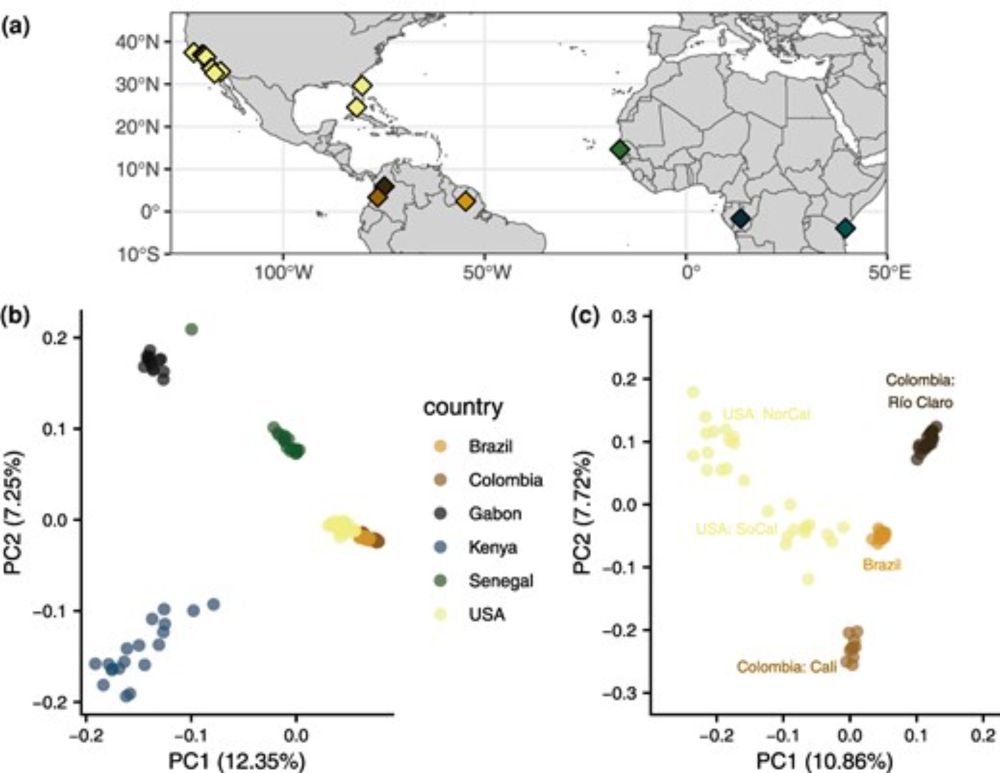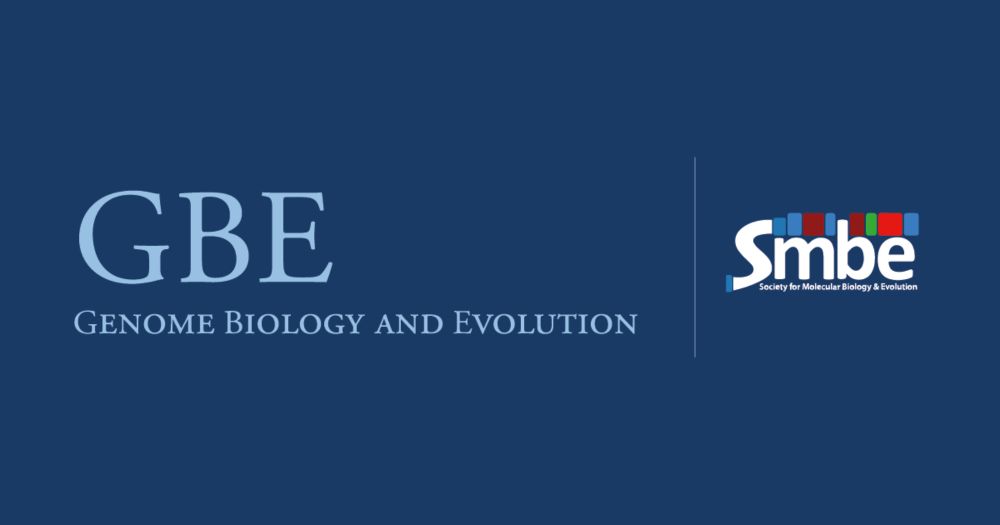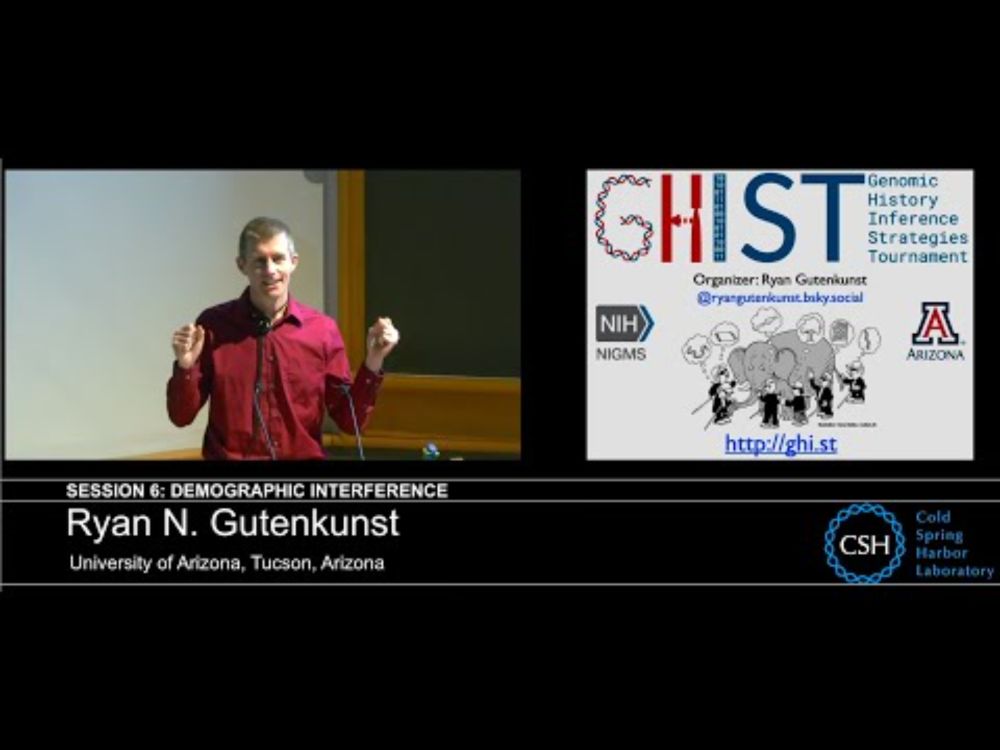
Austin Daigle
@adaigle.bsky.social
PhD Candidate in Bioinformatics & Computational Biology at UNC, coadvised by Dan Schrider & Parul Johri. I work on population genetics, transposon detection, and simulation-based inference—simulating evolution because real evolution takes way too long.
Reposted by Austin Daigle
Community competitions help benchmark approaches in computational biology. Struck et al. now present GHIST 2024 - The First Genomic History Inference Strategies Tournament, for the inference of evolutionary history from genome data.
🔗 doi.org/10.1093/molbev/msaf257
#evobio #molbio #compbio #popgen
🔗 doi.org/10.1093/molbev/msaf257
#evobio #molbio #compbio #popgen

November 6, 2025 at 3:20 PM
Community competitions help benchmark approaches in computational biology. Struck et al. now present GHIST 2024 - The First Genomic History Inference Strategies Tournament, for the inference of evolutionary history from genome data.
🔗 doi.org/10.1093/molbev/msaf257
#evobio #molbio #compbio #popgen
🔗 doi.org/10.1093/molbev/msaf257
#evobio #molbio #compbio #popgen
Reposted by Austin Daigle
New research by
@tylervkent.bsky.social @samurscicop.bsky.social & D. Matute analysed 131 genomes of the globally invasive Aedes aegypti, and found high genomic resilience despite historical eradication attempts for this globally invasive vector.
🔗 doi.org/10.1093/gbe/...
#genome #mosquitoes
@tylervkent.bsky.social @samurscicop.bsky.social & D. Matute analysed 131 genomes of the globally invasive Aedes aegypti, and found high genomic resilience despite historical eradication attempts for this globally invasive vector.
🔗 doi.org/10.1093/gbe/...
#genome #mosquitoes

Demographic History, Genetic Load, and the Efficacy of Selection in the Globally Invasive Mosquito Aedes aegypti
Abstract. Aedes aegypti is the main vector species of yellow fever, dengue, Zika, and chikungunya. The species is originally from Africa but has experience
doi.org
April 29, 2025 at 2:36 PM
New research by
@tylervkent.bsky.social @samurscicop.bsky.social & D. Matute analysed 131 genomes of the globally invasive Aedes aegypti, and found high genomic resilience despite historical eradication attempts for this globally invasive vector.
🔗 doi.org/10.1093/gbe/...
#genome #mosquitoes
@tylervkent.bsky.social @samurscicop.bsky.social & D. Matute analysed 131 genomes of the globally invasive Aedes aegypti, and found high genomic resilience despite historical eradication attempts for this globally invasive vector.
🔗 doi.org/10.1093/gbe/...
#genome #mosquitoes
Reposted by Austin Daigle
Excited to share the first manuscript from my PhD in which we leveraged ultra-long Nanopore sequencing, D. melanogaster inbred lines, and a ton of manual validation to investigate the effects of long-read length on population-level structural variant (SV) calling accuracy! doi.org/10.1101/2025...

Manual validation finds only ultra-long long-read sequencing enables faithful, population-level structural variant calling in Drosophila melanogaster euchromatin
The increasing accessibility of long-read sequencing and the rapid development of automated variant callers are promoting the generation of population-level structural variation data. However, the eff...
doi.org
April 25, 2025 at 8:03 PM
Excited to share the first manuscript from my PhD in which we leveraged ultra-long Nanopore sequencing, D. melanogaster inbred lines, and a ton of manual validation to investigate the effects of long-read length on population-level structural variant (SV) calling accuracy! doi.org/10.1101/2025...
Reposted by Austin Daigle
Excited to see the final version of this paper with @samurscicop.bsky.social and Daniel Matute out in @genomebiolevol.bsky.social!
We took a dive into the complicated demographic history of Aedes aegypti mosquitoes and its impact on the distribution of genetic diversity
doi.org/10.1093/gbe/...
We took a dive into the complicated demographic history of Aedes aegypti mosquitoes and its impact on the distribution of genetic diversity
doi.org/10.1093/gbe/...

Demographic history, genetic load, and the efficacy of selection in the globally invasive mosquito Aedes aegypti
Abstract. Aedes aegypti is the main vector species of yellow fever, dengue, Zika and chikungunya. The species is originally from Africa but has experienced
doi.org
April 7, 2025 at 7:53 PM
Excited to see the final version of this paper with @samurscicop.bsky.social and Daniel Matute out in @genomebiolevol.bsky.social!
We took a dive into the complicated demographic history of Aedes aegypti mosquitoes and its impact on the distribution of genetic diversity
doi.org/10.1093/gbe/...
We took a dive into the complicated demographic history of Aedes aegypti mosquitoes and its impact on the distribution of genetic diversity
doi.org/10.1093/gbe/...
Reposted by Austin Daigle
Amid the chaos, it was great to share results from the first Genomic History Inference Strategies Tournament at ProbGen25. Watch the talk to learn about the future of GHIST and @andrewhvaughn.bsky.social's nefarious metagaming of demographic inference. 😀 www.youtube.com/watch?v=3_dv...

Talk describing the results of GHIST1 at ProbGen 25.
YouTube video by Ryan Gutenkunst
www.youtube.com
March 17, 2025 at 3:53 PM
Amid the chaos, it was great to share results from the first Genomic History Inference Strategies Tournament at ProbGen25. Watch the talk to learn about the future of GHIST and @andrewhvaughn.bsky.social's nefarious metagaming of demographic inference. 😀 www.youtube.com/watch?v=3_dv...
Reposted by Austin Daigle
Every day I wake up to new horrors and my Id demands blood but I have written this paper on pseudo-overdominance in polyploids instead www.biorxiv.org/content/10.1...

Recombination and the role of pseudo-overdominance in polyploid evolution
Natural selection is an imperfect force that can under some conditions fail to prevent the buildup of deleterious mutations. Small population sizes and the lack of recombination are two such scenarios...
www.biorxiv.org
March 7, 2025 at 12:38 AM
Every day I wake up to new horrors and my Id demands blood but I have written this paper on pseudo-overdominance in polyploids instead www.biorxiv.org/content/10.1...
Excited to share my first PhD project with my mentor, @johriparul.bsky.social! We examine how Hill–Robertson interference (HRI) in highly selfing species biases estimates of the distribution of fitness effects of new mutations (DFE).
doi.org/10.1093/evol...
@journal-evo.bsky.social #popgen #evobio
doi.org/10.1093/evol...
@journal-evo.bsky.social #popgen #evobio

March 5, 2025 at 6:36 PM
Excited to share my first PhD project with my mentor, @johriparul.bsky.social! We examine how Hill–Robertson interference (HRI) in highly selfing species biases estimates of the distribution of fitness effects of new mutations (DFE).
doi.org/10.1093/evol...
@journal-evo.bsky.social #popgen #evobio
doi.org/10.1093/evol...
@journal-evo.bsky.social #popgen #evobio
Thrilled to have been part of the inaugural GHIST competition in population genetics inference! Big thanks to the organizers for a fun and challenging event. Congrats to Andrew Vaughn and Ekaterina Noskova for their impressive performance, I'm looking forward to reading about everyone's methods.
Congrats to Andrew Vaughn @andrewhvaughn.bsky.social, for winning 3 out of 4 challenges in the inaugural GHIST competition in population genetics inference. He not only submitted accurate inferences, he also gamed the system by further optimizing his score beyond the maximum likelihood inferences. 😜

December 11, 2024 at 4:46 PM
Thrilled to have been part of the inaugural GHIST competition in population genetics inference! Big thanks to the organizers for a fun and challenging event. Congrats to Andrew Vaughn and Ekaterina Noskova for their impressive performance, I'm looking forward to reading about everyone's methods.

